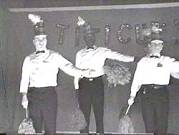|
|
||||
|
|
by Donald Levit  Right from his first feature Titicut Follies, Frederick Wiseman’s career theme was announced. Though today ignored in all but specialized media studies, Wiseman would go on to become a significant contributor to the heyday of “public,” as opposed to “commercial,” television thirty years ago. For two decades, this lawyer turned filmmaker did a series of legendary but now not often seen interconnected studies of the institutional structures by which power in America protects, or isolates, itself from potential domestic sore spots--schools, the courts, boot camp, health care, hospitals, welfare, religion and, in that 1967 début, the Bridgewater, Massachusetts, State Prison for the Criminally Insane. Above all an educational force, these films were at one time a hard-hitting graphic mainstay for school and college classes. Following the line of revolutionary Time, Inc., documentarist Robert Drew and Louisiana Story cameraman Richard Leacock in eschewing Flaherty and successors’ scripted, title carded, onscreen hosted or narrative voiced modus, they remain text examples of direct cinema/cinema verité, observing subjects without pious overt editorializing. Dependent on newly developed lightweight mobile equipment allowing for automatic synchronization of film and sound -- himself doing the tape recording while signaling directions to his cameraman --Wiseman in essence eliminated the intermediary in Titicut Follies, his first full-length. The title derives from the name of a briefly shown revue put on by the racially mixed inmates for -- presumably, since an audience is never seen -- staff and fellow prisoners. So greatly does the filmmaker absent his presence or any other “outside” from his product that, with no chyron-subtitles, only two or three times are people identified, by a first name dropped in speech. Thus, for example, it is not until a later dreary on-site birthday party that the Follies MC and spotlight-hogging singer is visually revealed to be a gregarious uniformed policeman. The resultant anonymity of charges and caretakers -- read, “jailed” and “jailors”-- and administrators is a suggestion of the dehumanization implicit in an apathetic ineffective system. Dealing directly and, importantly, on an intimate physical level with inmates, the guards seem the most human of the inhuman system. Illumination throughout is from available sources, so corridors are overly bright, cells and treatment rooms unevenly lit up only at wired windows, and the face of the Chaplinesque cop-master of ceremonies is brightened by footlights from below, resulting in the sinister distortion of horror-movie bottom lighting. This obnoxious hail-fellow-well-met cheerleader type is not, however, your A-villain. That character is reserved half for the review board, particularly its chairman (the only member given a separate scene), whose ominously laconic shrinks and degreed social workers coldly interview, condemn and discuss in psychobabble. Some of the factory assembly line of prisoners exhibit the physical signs of mental impairment, some talk nonstop evidencing emotional disturbance from word one, while of the few allotted more time a couple start out superficially rational but degenerate as they ramble on. With no offscreen voice or any external explanations, there is only rarely any information as to why exactly these men have been confined, but in one or two cases their talk indicates sexual depredation, especially pedophilia. Not more common but more openly debated today even to mainstream stuff like Little Children, neither this terrible crime nor any other is soft-pedaled. But neither is there any institutional plan beyond increasing dosages of stupefacients. Standing in for the nasty State is a supremely onerous Dr. Strangelove-accented head doctor who perks up for confessions about perpetrators’ sex practices and smokes a cigarette to dangling ash while inserting a nostril tube to force feed an unresponsive inmate who is at once shown in his coffin. In that day when there was less mass competition from the inanities of the rest of Minnow’s wasteland, film reporting like Titicut Follies won prizes and was so effective that, contravening its own prior approval, the (Released by Zipporah Films; not rated by MPAA.) |
||
|
© 2024 - ReelTalk Movie Reviews Website designed by Dot Pitch Studios, LLC |



